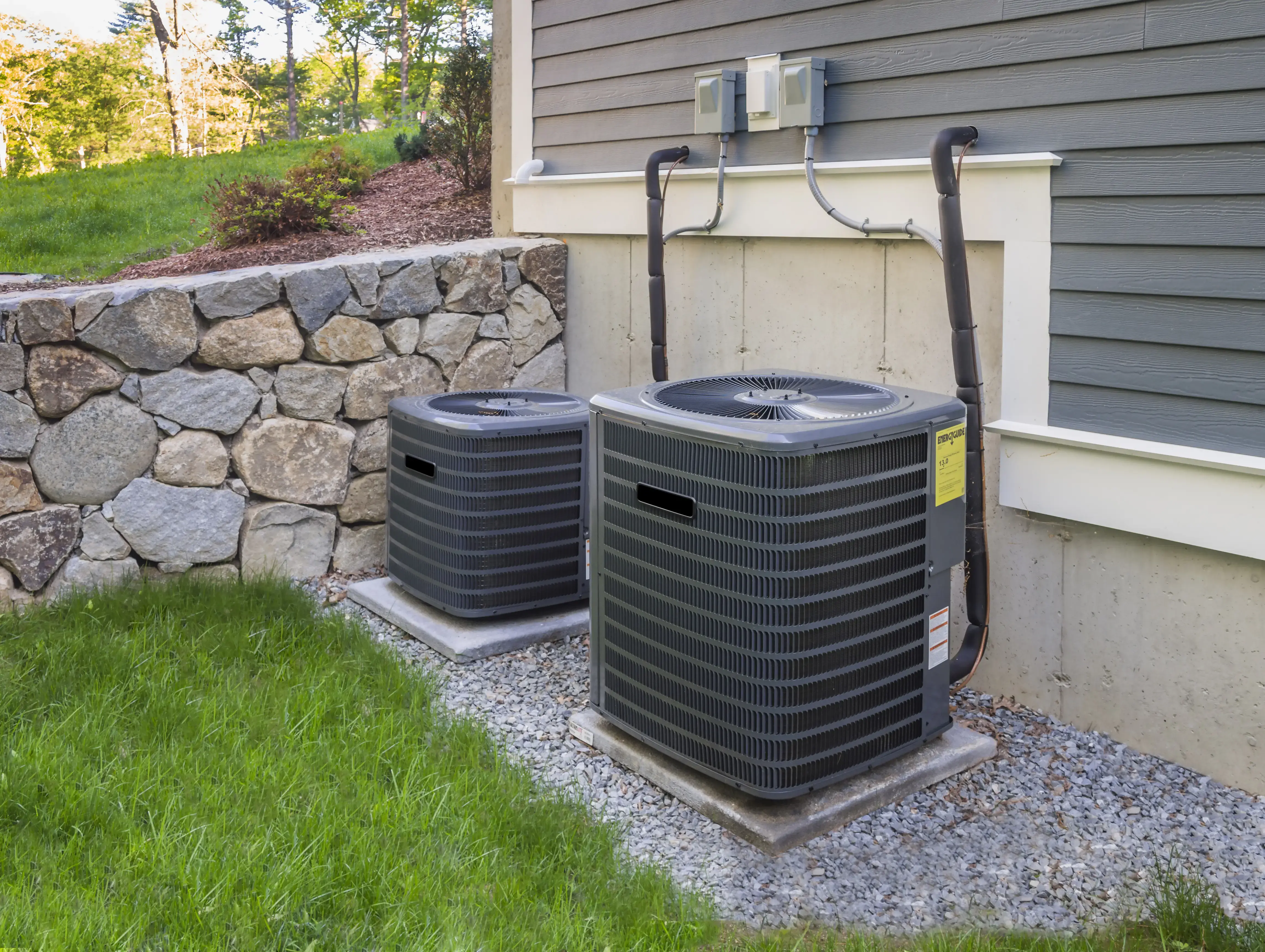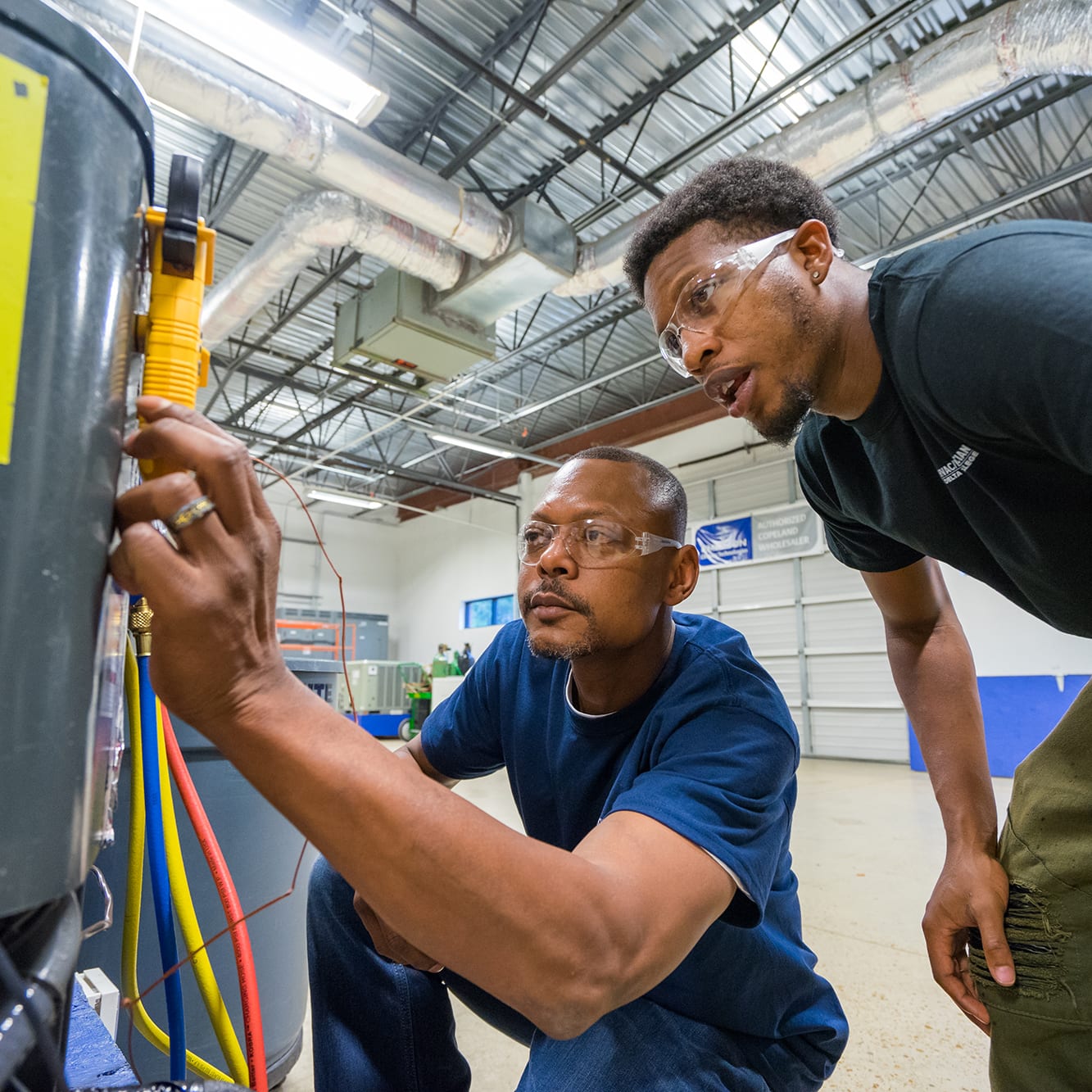Discovering the Crucial Components of an Efficient HVAC System
An effective cooling and heating system is improved a number of essential elements that work in consistency. Each component, from the thermostat to the ductwork, plays an important duty in keeping convenience and power efficiency. Understanding these components is vital for optimizing performance and enhancing indoor air top quality. As one takes a look at these elements, the intricate connections between them expose understandings into boosting general system performance. What particular variables add most to this effectiveness?
The Role of the Thermostat in HVAC Efficiency

Often forgotten, the thermostat plays an essential duty in the efficiency of A/c systems. This tiny tool works as the main control center, controling temperature setups and guaranteeing ideal comfort within a room. By properly noticing the ambient temperature level, the thermostat connects with the heating, air, and air flow conditioning units to preserve the wanted climate
A reliable thermostat reduces energy consumption by triggering the heating and cooling system only when required, therefore preventing too much heating or air conditioning. Modern clever and programmable thermostats improve this effectiveness better by enabling individuals to establish timetables and remotely adjust setups, adjusting to day-to-day routines.
The positioning of the thermostat is essential; improper area can lead to imprecise temperature readings, resulting in inefficient procedure. On the whole, a well-functioning thermostat not just enhances convenience yet also adds substantially to power financial savings and the longevity of the cooling and heating system.
Understanding the Importance of Air Filters
Air filters offer a crucial function in cooling and heating systems by assuring that the air flowing within a space continues to be tidy and healthy and balanced. These filters trap dirt, allergens, and various other contaminants, stopping them from being recirculated throughout the atmosphere. By recording these particles, air filters add to boosted indoor air top quality, which can significantly profit passengers' health, especially those with allergic reactions or breathing problems.
Furthermore, preserving clean air filters improves the performance of HVAC systems. Clogged up filters can limit air movement, creating the system to work more difficult to keep desired temperature levels, bring about raised energy intake and higher energy expenses. On a regular basis changing or cleansing filters is an important maintenance action that can lengthen the lifespan of a/c tools. Ultimately, recognizing the value of air filters enables home owners and structure managers to take positive steps to ensure a well-functioning, reliable a/c system that advertises a comfy and secure interior setting.

The Functionality of the Furnace and Heatpump
Heating systems and heatpump are essential elements of cooling and heating systems, accountable for giving warmth throughout chillier months. Heating systems operate by home heating air through combustion or electric resistance, after that distributing it throughout the home using air ducts. They usually supply rapid home heating and can be fueled by natural gas, electricity, or oil, depending upon the system type.
Alternatively, heatpump transfer warmth instead than create it. They draw out warm from the outdoors air or ground, also in low temperatures, and move it inside. HVAC experts. This double capability allows warmth pumps to additionally offer air conditioning in warmer months, making them flexible choices for year-round environment control
Both systems call for proper upkeep to assure effectiveness and durability. While heating systems master severe cold, heatpump can be helpful in moderate climates. Comprehending their unique functionalities aids home owners in choosing one of the most suitable alternative for their heating needs.
Exploring the Cooling System
The air conditioning device is an essential element of a/c systems, available in various kinds to suit different needs. Understanding the effectiveness ratings of these units is crucial for making educated choices concerning energy intake and expense. This section will certainly explore the varied kinds of air conditioning unit and clear up how effectiveness rankings influence performance.
Types of Air Conditioners
While numerous elements affect the option of air conditioning systems, recognizing the various types offered is important for home owners and building managers alike. Central air conditioning conditioners are created to cool whole homes or structures, utilizing a network of air ducts for airflow. Window units supply an even more localized option, ideal for little rooms or solitary spaces. Portable a/c unit provide adaptability, allowing users to move the system as needed. Ductless mini-split systems are one more choice, integrating the efficiency of central systems with the comfort of zoning, as they require no ductwork. Geothermal systems harness the planet's temperature level for energy-efficient cooling. Each type features distinct advantages, making educated selections important for efficient climate control.

Efficiency Ratings Explained
Recognizing performance ratings is necessary for choosing the appropriate a/c device, as these metrics supply understanding into the system's performance and energy intake. The most typical score for a/c is the Seasonal Power Performance Proportion (SEER), which measures the cooling output throughout a regular cooling season separated by the total electric power input. A higher SEER suggests much better performance. In addition, the Power Performance Proportion (EER) is used for determining performance under details problems. One more crucial metric is the Energy Star certification, which indicates that an unit fulfills rigorous energy efficiency guidelines. By reviewing these rankings, customers can make informed choices that not just maximize comfort yet likewise minimize energy costs and environmental impact.
The Importance of Ductwork and Air flow
Reliable ductwork layout and air flow administration play crucial roles in the total effectiveness and performance of heating and cooling systems. Appropriate ductwork guarantees that conditioned air is dispersed evenly throughout a space, lessening temperature level variations and enhancing comfort. Well-designed air ducts lessen resistance to airflow, lowering the workload on cooling and heating equipment and inevitably reducing power usage.
Air movement management includes strategically putting vents and registers to improve the circulation of air. This prevents common problems such as hot or cool spots, which can occur when air flow is blocked or improperly well balanced. Furthermore, the ideal air duct materials and insulation can better improve effectiveness by lowering warmth loss or gain throughout air transportation.
An effective ductwork system not only adds to power financial savings however can additionally lengthen the life-span of a/c devices by decreasing unneeded pressure (HVAC experts). Subsequently, comprehending the significance of ductwork and air flow is vital for achieving peak HVAC system efficiency
Routine Upkeep Practices to Improve Efficiency
Routine maintenance techniques are necessary for guaranteeing peak efficiency of heating and cooling systems. These techniques consist of routine inspections, cleansing, and required repair work to keep the system running effectively. Routinely transforming air filters is important, as stopped up filters can block air movement and lower effectiveness. Additionally, technicians need to inspect and tidy evaporator and condenser coils to stop overheating and energy waste.
Annual specialist evaluations are also advised, as qualified technicians can determine prospective concerns before they intensify. Oiling moving components minimizes deterioration, adding to a much longer life-span for the system. Making sure that the thermostat works appropriately aids in keeping suitable temperature control.
Regularly Asked Inquiries
Just how Frequently Should I Change My Thermostat?
Thermostats need to typically be changed every 5 to 10 years, depending on usage and modern technology advancements. Normal checks are a good idea to ensure peak performance, specifically if experiencing inconsistent temperature level control or enhanced power costs.
What Dimension Air Filter Is Finest for My Cooling And Heating System?
The very best dimension air filter for a HVAC system varies by device layout. Typically, it's essential to speak with the proprietor's manual or examine the existing filter measurements to assure peak efficiency and air top quality.
Can I Mount a Warmth Pump Myself?
Installing a warmth pump independently is feasible for experienced people, yet it needs knowledge of electric systems and local codes. Working with an expert is recommended to ensure correct setup and suitable system efficiency.
How Do I Know if My Ductwork Is Effective?
To figure out ductwork effectiveness, one ought to look for leakages, measure airflow at vents, inspect insulation top quality, and examine temperature differences in between supply and return ducts. Expert evaluations can provide thorough insights right into general performance.
What Are Indicators My HVAC Demands Immediate Upkeep?
Signs that a HVAC system requires instant maintenance include unusual noises, irregular temperature levels, raised power bills, undesirable click here smells, and constant cycling. Addressing these problems immediately can prevent additional damage and guarantee optimal system efficiency.
Air filters serve an essential feature in Heating and cooling systems by guaranteeing that the air flowing within a space stays healthy and balanced and tidy. Additionally, preserving tidy air filters enhances the effectiveness of A/c systems. Ductless mini-split systems are another option, integrating the effectiveness of main systems with the benefit of zoning, as they call for no ductwork. Comprehending performance ratings is vital for selecting the best air conditioning device, as these metrics provide insight right into the system's efficiency and power intake. The best size air filter for a HVAC system differs by device design.